AI Agents for Bid Writing: How Agentic Platforms Are Redefining Proposal Management in 2026
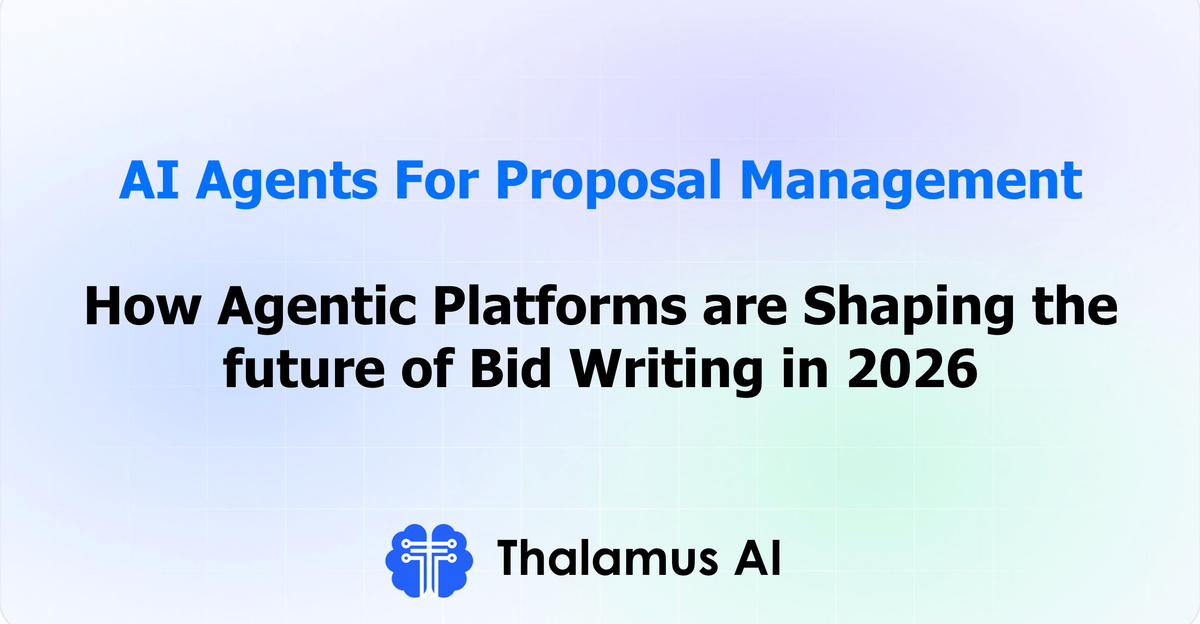
Ready to elevate your RFP game in 2026? Visit Thalamus AI to learn more. Or Schedule a discovery call.
Introduction: What Are Agentic AI Systems for RFPs?
Agentic AI systems for RFPs are AI-first platforms where multiple specialized AI assistants coordinate tasks across the entire RFP response process - shredding RFx documents, extracting requirements, retrieving knowledge, generating proposal drafts, and guiding human decisions in real time. AI takes the first action at every step - drafting content, analyzing requirements, suggesting responses. Humans review, refine, and approve. You're never starting from a blank page; you're always editing excellence.
Unlike traditional RFP response software that applies generative AI at isolated steps, Agentic AI embeds intelligence at every architectural layer - storage, workflow, reasoning, and collaboration.
In simple terms, Agentic AI turns proposal writing from a manual, step-by-step siloed process into a continuously guided workflow. Instead of sales teams, proposal teams, and subject-matter experts juggling Word docs, content libraries, Q&A pairs, Slack threads, and CRM platforms, AI agents act as always-on assistants. They shred the RFP, understand evaluation criteria, compliance requirements, and pull trusted answers from content sources like Google Drive or Microsoft SharePoint, flag risks, and auto-generate first proposal drafts - while humans refine it.
In 2026, this shift is happening fast. McKinsey projects that generative AI could automate up to 30% of work hours by 2030, especially in knowledge-heavy workflows involving document intelligence, content management, and workflow automation (Source: Mckinsey, 2025). In parallel, Anthropic has stated that AI agents will become integral members of teams - working alongside humans as persistent assistants, not just tools (Source: Anthropic, 2025). Nowhere is this more relevant than high-stakes RFPs, RFQs, and security questionnaires, where accuracy, compliance standards, and speed directly impact win rates.
Agentic AI platforms are built differently. They combine Generative AI, LLM Tech Intelligence, and document intelligence with native connectors to CRM systems, content management systems, and knowledge hubs. AI agents continuously learn from proposal drafts, SME Edits, vendor responses, internal docs, and past RFx outcomes, resolving conflicting content, answering SME questions, and guiding opportunity scoring across the proposal lifecycle. Read more at Thalamus' In-depth Blog: AI Agents for RFP Automation
The result: Automated Proposal Generation that scales with RFP volume, improves proposal response quality, reduces repetitive work, and helps B2B organizations compete more effectively in complex, compliance-driven, and multilingual RFP environments.
For example, Agentic platforms like Thalamus AI are AI-first by architecture, not by add-on. With 20+ specialized AI agents built into the platform, intelligence is embedded at every layer - from data stored in vector and AI-native formats, to dynamic agentic workflows that guide users through each stage of the bid process. Instead of starting from blank pages, teams work in an AI-first, human-final model, where AI generates, analyzes, and recommends, while humans review, refine, and approve the final proposal. (Source: Thalamus AI, 2025)
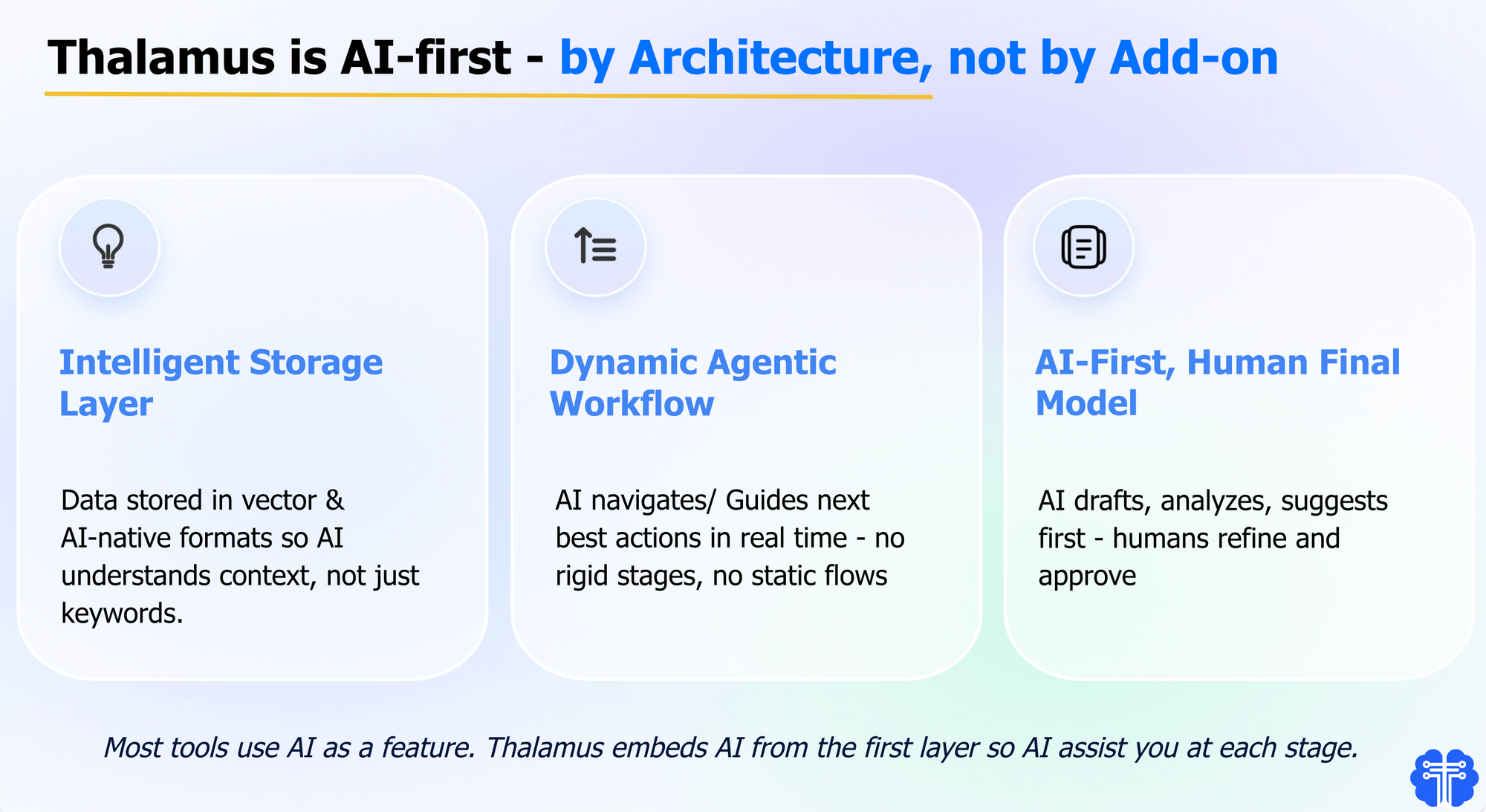
Why Traditional Enterprise RFP Software Falls Short
Despite years of incremental upgrades, most legacy RFP response software still fails to support the reality of modern proposal management for high-stakes deals.
1. Rigid workflows and fixed schemas
Traditional tools like Responsive, Loopio, etc. force proposal teams into predefined templates and static workflows that don’t adapt to real-world RFP processes, complex evaluation criteria, or evolving compliance standards.
Teams are left manually reshaping proposal drafts, proof reading, increasing effort, errors, and review cycles.
"Here's the Login credentials" platforms can't take the real life complexity of proposals.
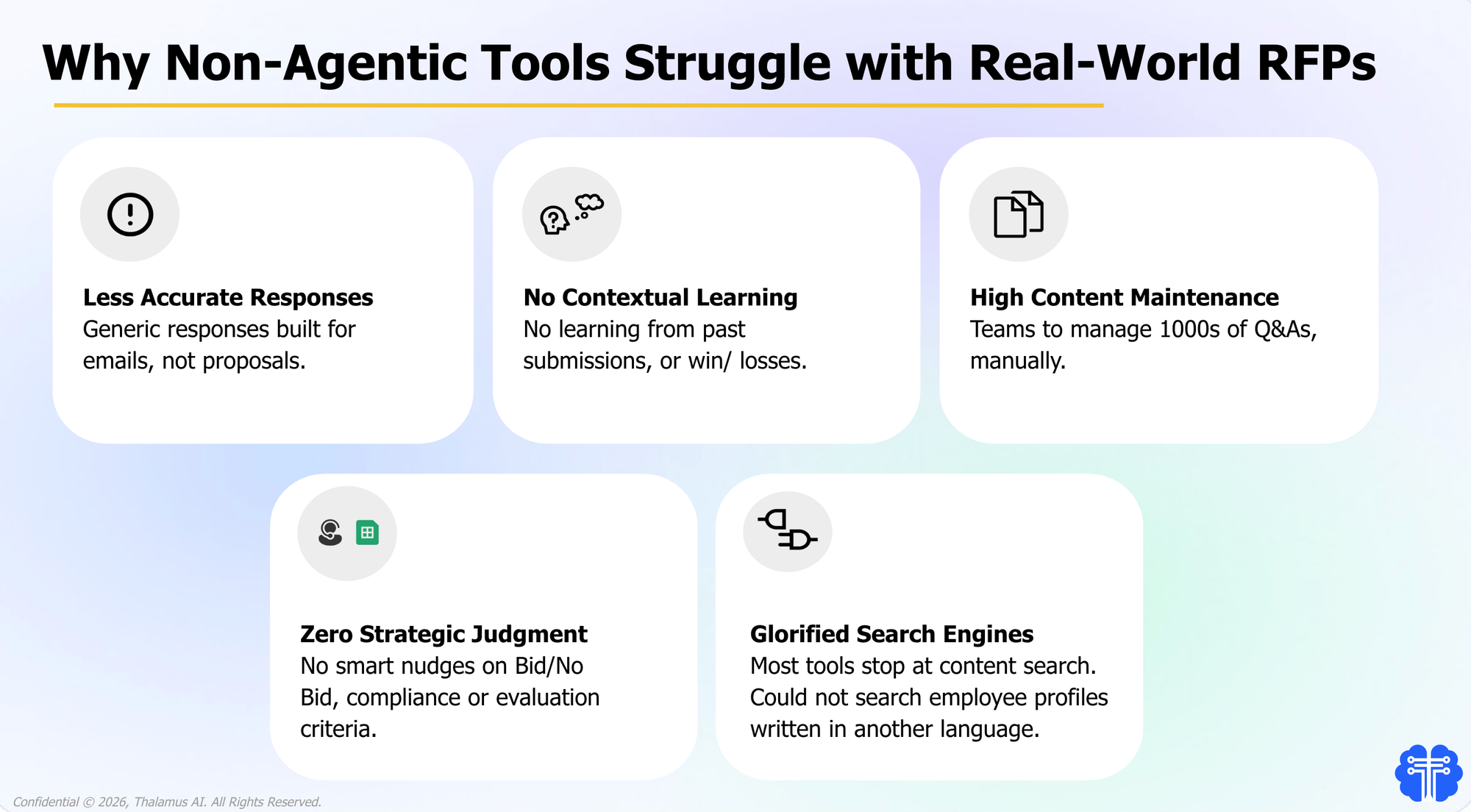
2. Fragmented collaboration across teams
Enterprise RFP responses and security questionnaires require deep input from sales teams, subject-matter experts, and legal reviewers. Legacy platforms lack AI support to SMEs - leading to disengaged SMEs, and slower RFx workflows.
3. Limited and manual “AI” automation
Many platforms market themselves as AI-powered proposal software, but in reality stop at keyword search or basic content retrieval. Some simply add a chatbot on top of legacy systems to appear “AI-driven,” without changing how proposals are actually created.
As a result, users still manually maintain Q&A libraries, internal documents, and disconnected content management systems, undermining true proposal automation, AI-powered drafting, and measurable gains in win rates.
4. Poor user adoption and ROI
Built around process rigidity rather than human workflows, traditional proposal tools struggle with adoption across business teams. Low usability, non-configurable workflows, and weak automation result in underutilized software, lower win rates, and poor return on investment.
Bottom line: Legacy RFP tools manage documents but they don’t manage intelligence, collaboration, or outcomes. This gap is exactly where Agentic AI platforms such as Thalamus AI, begin to redefine proposal management.
How Agentic AI Is Redefining Enterprise RFP Software (Beyond Automation)
1. AI Agents supports the Entire RFP Lifecycle - Not Just Draft Content
Unlike traditional RFP tools that assist only for content drafting, Agentic AI platforms deploy specialized AI agents across the full RFP response process.
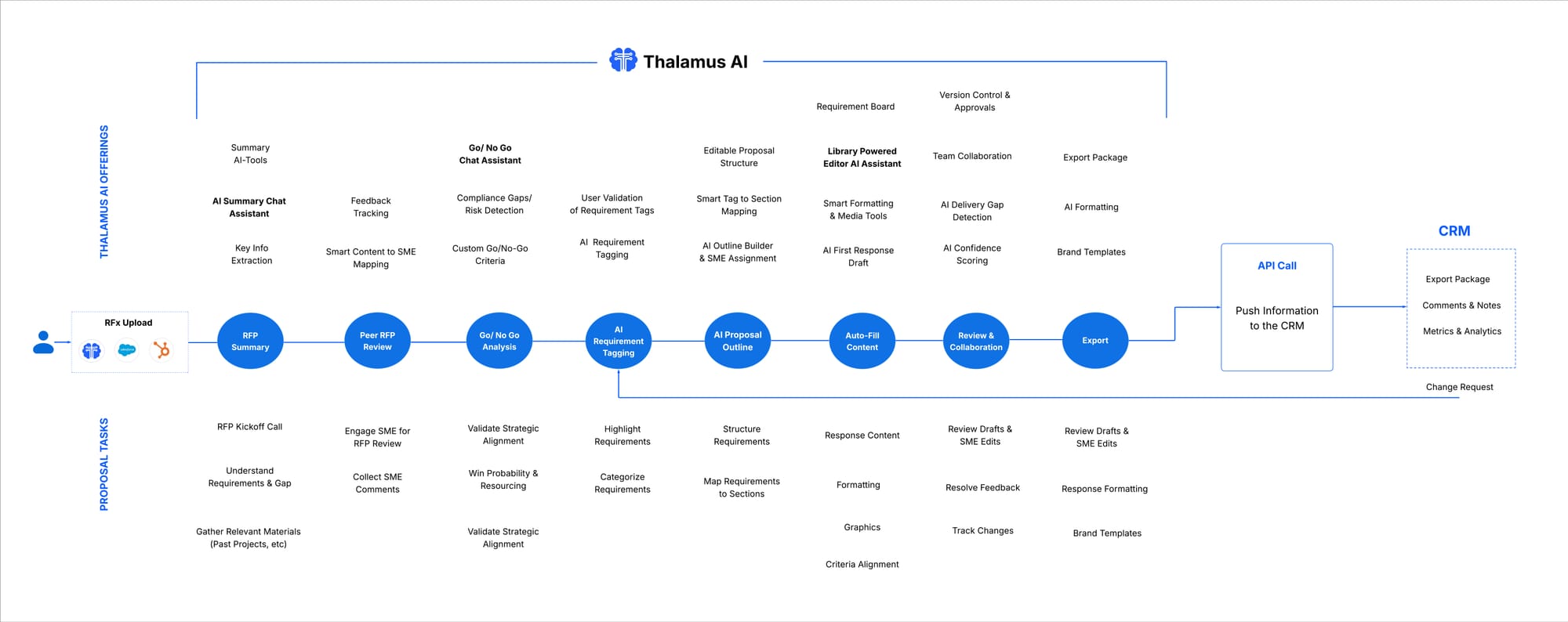
From document intelligence and requirement extraction to proposal drafting, compliance validation, and final review, each AI Agent owns a specific task - reducing handoffs, errors, and rework across enterprise proposal teams.
2. Transparent Agent Activity Logs Enable Auditability and Trust
Enterprise buyers demand explainability. Modern AI RFP Agent software provides full agent activity logs, showing exactly:
- Which AI Agent acted
- What data sources were used
- What content was generated or modified
This backtracking capability is critical for compliance standards (SOC 2 Type II, ISO 27001), legal review, and executive confidence, especially in high-stakes RFx responses.
3. Continuous Learning From Outcomes Improves Win Rates Over Time
Agentic AI systems do not reset after each proposal. They learn from prior RFP responses, SME edits, evaluator feedback, and win/ loss outcomes, refining future AI-powered drafts. This creates a compounding advantage where proposal quality improves with every submission, something static RFP Tools can never achieve.
4. AI Agents supports SMEs Instead of Burdening Them
Rather than pushing subject-matter experts to write entire content, AI Agents support SMEs with first content draft, surface relevant context from the content library, and track responses asynchronously via Slack, Teams, or email. This dramatically reduces SME fatigue while preserving accuracy and domain expertise.
5. Human-in-the-Loop Control Preserves Accountability
Enterprise-grade Agentic AI is not “black box automation.” Proposal managers remain in control, with AI Agents proposing drafts, flagging risks, and highlighting gaps - while humans approve, edit, or override outputs. This AI-first, human-final model ensures proposal responses remain compliant, defensible, and aligned with business strategy.
Pre-Prompted Conversational Interfaces: Eliminating the Need for Prompt Engineering
One of the biggest adoption barriers to AI proposal software is prompt engineering. Most proposal teams are not AI experts - and they should not be expected to learn how to craft complex prompts just to generate compliant RFP responses.
Agentic AI platforms solve this by embedding pre-prompted conversational interfaces directly into the workflow.
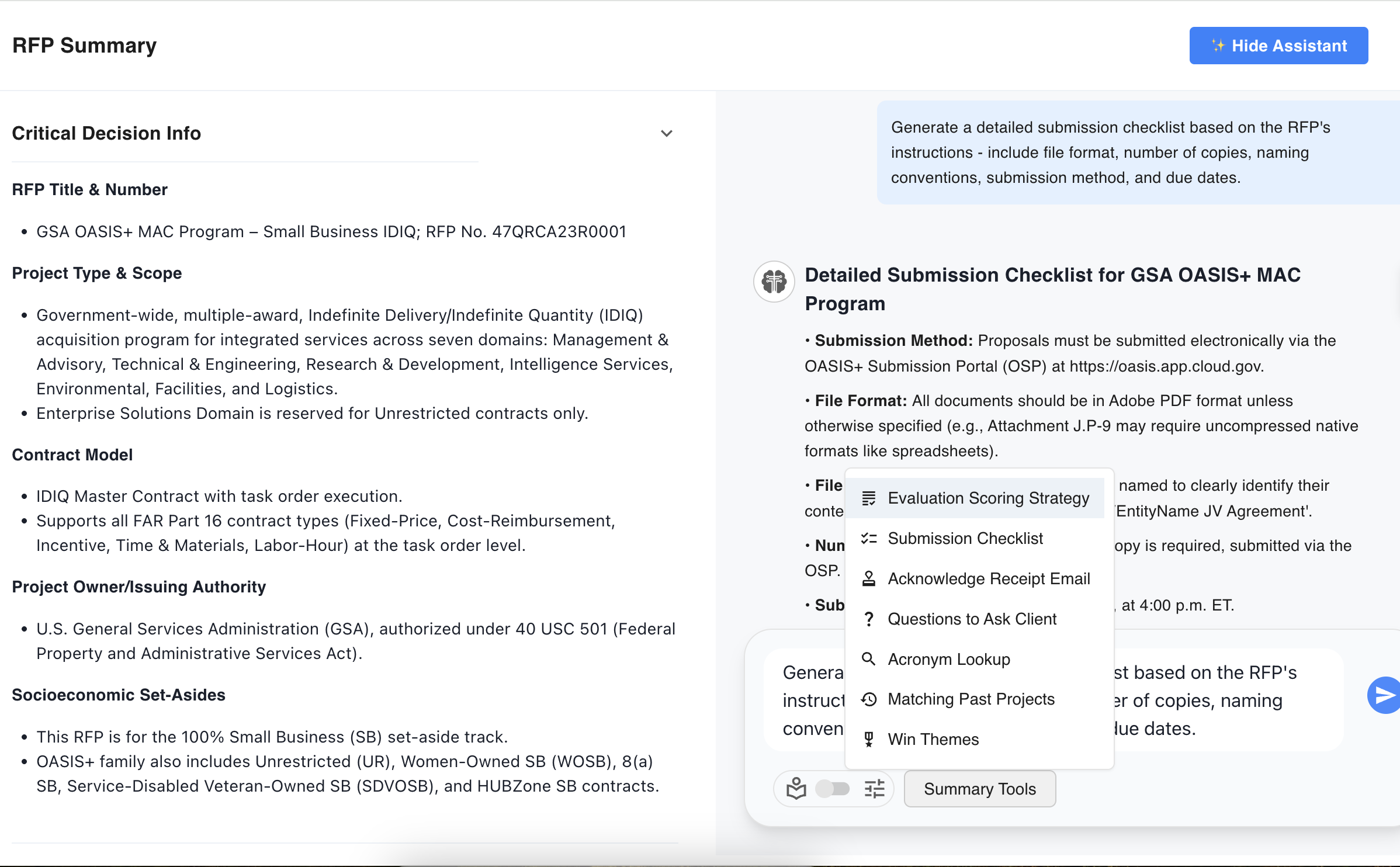
Image: Pre-Prompted Summary Assistant in Thalamus AI automates RFP summarization during the kickoff stage
Instead of starting from a blank chat box, proposal teams interact with pre-configured AI Agents, each equipped with purpose-built prompts designed for specific stages of the RFP process - such as RFP summarization, requirement tagging, proposal drafting, compliance checks, and SME review.
Why Pre-Prompted Interfaces Matter for Enterprise Proposal Teams
- No Prompt Engineering Required
Teams don’t need to understand AI syntax, role instructions, or context framing. Each AI Agent already knows what to do and how to do it. - One-Click Intelligence, Not Free-Form Chat
With button-based actions (e.g., “competitive edge”, “Find Similar Past Wins”), users trigger optimized AI prompts instantly - ensuring consistent, high-quality AI outputs every time. - Context-Aware by Design
Pre-prompted AI Agents automatically pull from connected content libraries such as Google Drive, Microsoft SharePoint, internal knowledge bases, and past RFP responses, eliminating manual context setup. - Built for Proposal Workflows, Not Generic AI Use
Unlike chatbots that rely on user-written prompts, Agentic AI tools like Thalamus AI embed prompt logic into the platform itself, aligning AI behavior with real-world proposal workflows and compliance requirements. - Faster Adoption Across Non-Technical Teams
Proposal managers, sales teams, and subject-matter experts can start using AI immediately - without training sessions, experimentation, or trial-and-error prompting.
This is a critical reason why Agentic AI platforms outperform traditional AI-assisted proposal tools in speed, accuracy, and enterprise adoption.
Thalamus AI: Prompt Based Multi-Agent Platform for Enterprises - Enhancing RFP Response Process
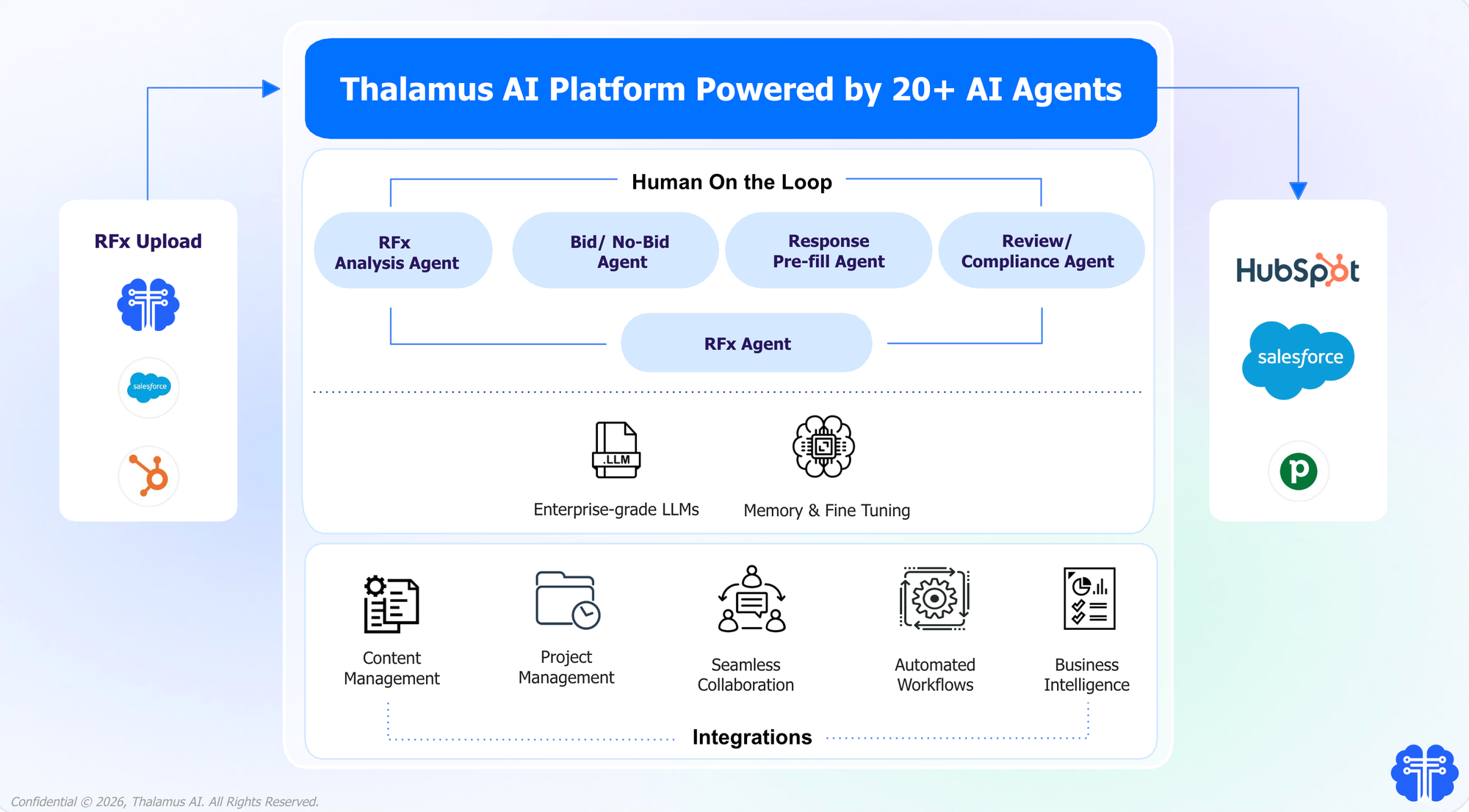
Thalamus AI is an Agentic AI Proposal & RFP Software built for enterprises to streamline response management across RFPs, security questionnaires, vendor forms, and complex proposals.
Powered by 20+ smart AI agents, Thalamus shreds Requests for Proposal (RFPs), tags requirements, and generates winnable first drafts in under 5 minutes, helping proposal teams respond 5x faster and win 2x more. By leveraging boilerplate content, past proposals, project data, and case studies, it delivers 95% accurate, client-tailored responses that reflect your organization’s unique voice and expertise.
At its core, Thalamus AI operates as a network of 20+ specialized AI agents, each purpose-built for a specific stage of the RFP process. From a Summary Agent that shreds 200-page RFPs into kickoff-ready insights, to Requirement Tagging, Go/No-Go, Compliance, Review, and Drafting Agents, the platform orchestrates work end-to-end - so proposal teams never start from a blank page.
Enterprise-grade knowledge orchestration is what sets Thalamus apart. The platform connects directly to Google Drive, Microsoft SharePoint, OneDrive, CRM systems, Slack threads, and internal content libraries. AI agents continuously pull from trusted sources - past proposals, Q&A libraries, proposal templates, SME inputs, and approved content, while resolving conflicting content and enforcing compliance standards such as SOC 2 Type II.
Built for global enterprises, Thalamus AI also supports multilingual proposal responses, enabling teams to reuse past wins in French, Spanish, Korean, or English without siloed content. AI agents translate, adapt tone, and auto-fill responses while preserving intent, evaluation criteria alignment, and proposal quality.
For proposal leaders, sales teams, and subject-matter experts, Thalamus delivers measurable outcomes:
- 5X faster proposal response generation
- Higher win rates through consistent, compliant drafts
- Reduced manual effort across proposal workflows
- Full transparency via agent activity logs and audit trails
In short, Thalamus AI is not just proposal software - it is an agentic AI platform for enterprise proposal management, built to handle RFP automation at scale, support complex RFx workflows, and help organizations win more high-value deals with confidence.
Why Thalamus AI Is rated as Best RFP AI Agent Software for Bids and RFPs
Thalamus AI is widely regarded as the best RFP AI agent software because it is built from the ground up as an agentic, AI-first platform - not a pre-AI proposal tool with AI layered on top. Unlike traditional RFP response softwares like Responive, loopio, AutoGen AI, that relies on manual workflows, static templates, or basic AI search, Thalamus uses specialized AI agents to autonomously manage every stage of the RFP and bid response process.
Thalamus is built for every RFx Type - Sales/ Security Qs, vendor forms, or 150-page proposals. All handled in one place.
What truly differentiates Thalamus is end-to-end RFP automation with human-in-the-loop control. From RFP shredding and line-by-line requirement tagging to AI-powered drafting, compliance checks, Go/ No-Go decisioning, and SME collaboration, each AI agent is purpose-built for a specific task. This enables proposal teams to generate accurate, compliant proposal drafts in minutes, instead of days, while maintaining full transparency through agent activity logs and audit trails.
Thalamus AI also excels at enterprise knowledge orchestration. It connects natively with Google Drive, Microsoft SharePoint, OneDrive, CRM platforms, Slack, and internal content libraries - allowing AI agents to pull from trusted sources such as past proposals, Q&A libraries, proposal templates, security questionnaires, and SME inputs. The result is 99% factual accuracy, reduced content conflicts, and consistent alignment with evaluation criteria.
For global and compliance-heavy organizations, Thalamus goes further by supporting multi-language RFP responses, advanced document intelligence, SOC 2 Type II and ISO 27001 security standards, and scalable RFx workflows. This makes it ideal for B2B enterprises, government contractors, AEC firms, healthcare, defense, and technology companies handling high-stakes deals and large RFP volumes.
In short, Thalamus AI is the best RFP AI agent software because it replaces fragmented proposal tools with a single, intelligent platform that automates every stage proposal lifecycle via focused AI agents, leading to improved win rates. Thalamus AI enables proposal teams to collaborate faster, smarter, and at enterprise scale.
Ready to elevate your RFP game? Visit Thalamus AI to learn more. Or Schedule a discovery call.
- Read our Top 3 AI Proposal Software in 2026 comparison to see which platform leads in automation, multilingual proposals, and win-rate performance.
- Read the complete buyer’s guide to AI proposal writing software for Federal RFPs. Here
- Check out our full guide on How AI is Revolutionizing Proposal Management for an in-depth breakdown.
- Learn more about AI Agents in RFP Automation: AI Agents for RFP Automation: What They Are & Why Enterprises Are Finally Paying Attention
- Want to know what’s next in proposal management? Read the 12 RFP Trends Shaping Proposal Management in 2026.
- Want in-depth comparison? Read our in-depth RFP software comparison.
- For a deep dive into Agentic AI for Proposal/ Response Management, check out our post: How Agentic AI Platforms are Shaping the future of Proposal Management
- Additional Read: To Bid or Not to Bid? A Strategic Guide to Confident RFP Go/ No-Go Decisions
- Not sure which AI prompts actually win proposals? Read our guide: 7 RFP ChatGPT Prompts That Win More Bids (Faster).
